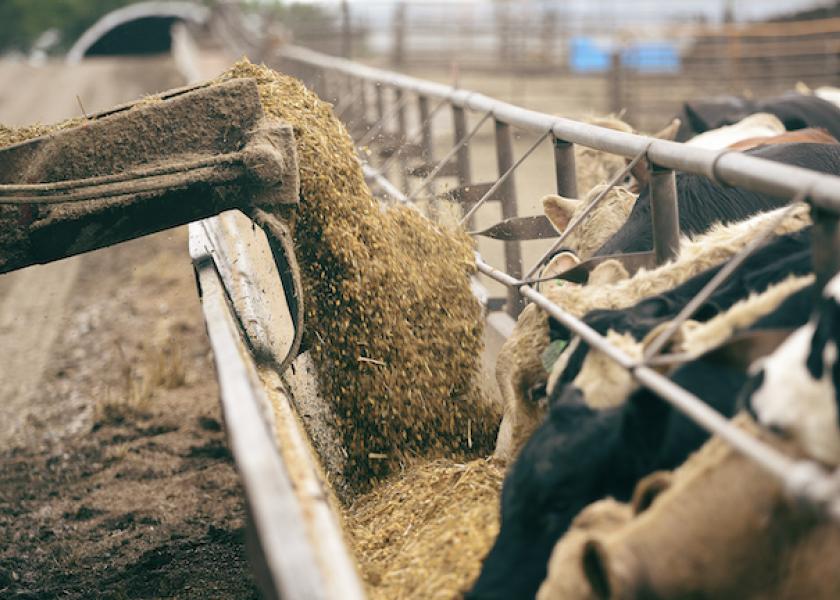The 'Golden Ticket' To Cattle Feeding Efficiency? It’s Been Found, FBN and Boveta Suggest

Has the 'golden ticket' to cattle feeding efficiency and carcass yield with reduction in methane gas emissions and wet waste been found? Farmers Business Network (FBN), along with its partner, Boveta Nutrition, LLC, believe so.
Recently, the companies announced results from an FBN-managed independent study at an operation outside of Lincoln, Nebr., trialing the partnership’s amino acid balancing program.
The farm manager, Ben Row at Talcott Land and Cattle, says their backgrounding operation went from $1.20 cost of gain, to now being around $0.71. Row also believes the health of the cattle and overall performance has improved on the program.
Additional findings from Boveta research with cattle on the company’s balanced diet plan conclude:
• Backgrounding cattle on forage diet showed $0.20 per lb. cost of gain advantage
• Finishing cattle consumed 15% less feed, maintained daily gain and delivered an average savings of $0.07 per pound gained
• A large commercial feedlot study produced a $30 per head advantage for steers
• In dairy cattle, milk yield increased by 3.9 lb/day or 4%
While these recent findings show a promising future in cattle production, it’s worth nothing that amino acid balancing is not a new concept.
“Amino acid balancing has been a standard nutritional practice in the swine and poultry industries to drive margin and animal growth, but we haven't been able to solve the riddle with beef cattle until now,” says Dr. Monty Kerley, FBN’s senior ruminant nutritionist, in the release. “After decades, we finally believe we’re able to deliver this solution to beef producers and its unique potential to decrease feed costs while maintaining optimal growth.”
Specifically, growth performance, average daily gain and feed efficiency rise to the top as the driving forces behind amino acid balancing, Kerley adds.
The program is set to begin with FBN customers with cattle operations in Iowa, Kansas, Minnesota, Missouri, Nebraska, Oklahoma, North Dakota and South Dakota—with plans to expand nationally and internationally in the future.
As the first step towards implementing the program, FBN offers a feed consultation and will take inventory of the producer’s available feed resources to formulate the best, most cost-efficient ration for the specific cattle in the current operation. Then, in balancing the amino acids, a unique ration and supplement will be formulated to complete the operation’s feeding plan.
Once the final nutrition recommendation is created and priced, the producer will then have the option to purchase the supplement and officially enter the program.
Kerley says obtaining the supplement should be no different for producers, as FBN and Boveta plan to work with local feed mills and cooperatives to fulfill the operation’s needs.
When encouraging producers to consider the program, Kerley explains, “Focus on cost of gain and not cost per ton. A lot of times, we change the proteins around. We may be looking at a $5, $10 or $15 per ton feed cost increase, but the reason we do that is because there's going to be a cost of gain advantage to the producers. They'll realize the net benefit.”
In addition to production performance and growth, the companies explain the environmental impacts of cattle production can also be improved through the program.
“Reducing intake by use of Boveta’s patent-pending diet formulation model improves income over feed costs by 8 to 12% while similarly reducing methane and wet waste. Combining that improved efficiency with reduced roughage intake provides a healthy, practical way to further improve profits and reduce methane emissions up to 30% or more,” says a Boveta research report.
The program is still in a very hands-on stage, and Gregory Mills, president and CEO of Boveta Nutrition, LLC, says the availability of a mobile app or computer software is not there yet.
More Boveta Nutrition, LLC research results from implementation of amino acid balancing and diet formulation in beef and dairy cattle can be found on the company's website.
Read More:
Proprietary Feeding System Improves Feed Efficiency and Carcass Yield







